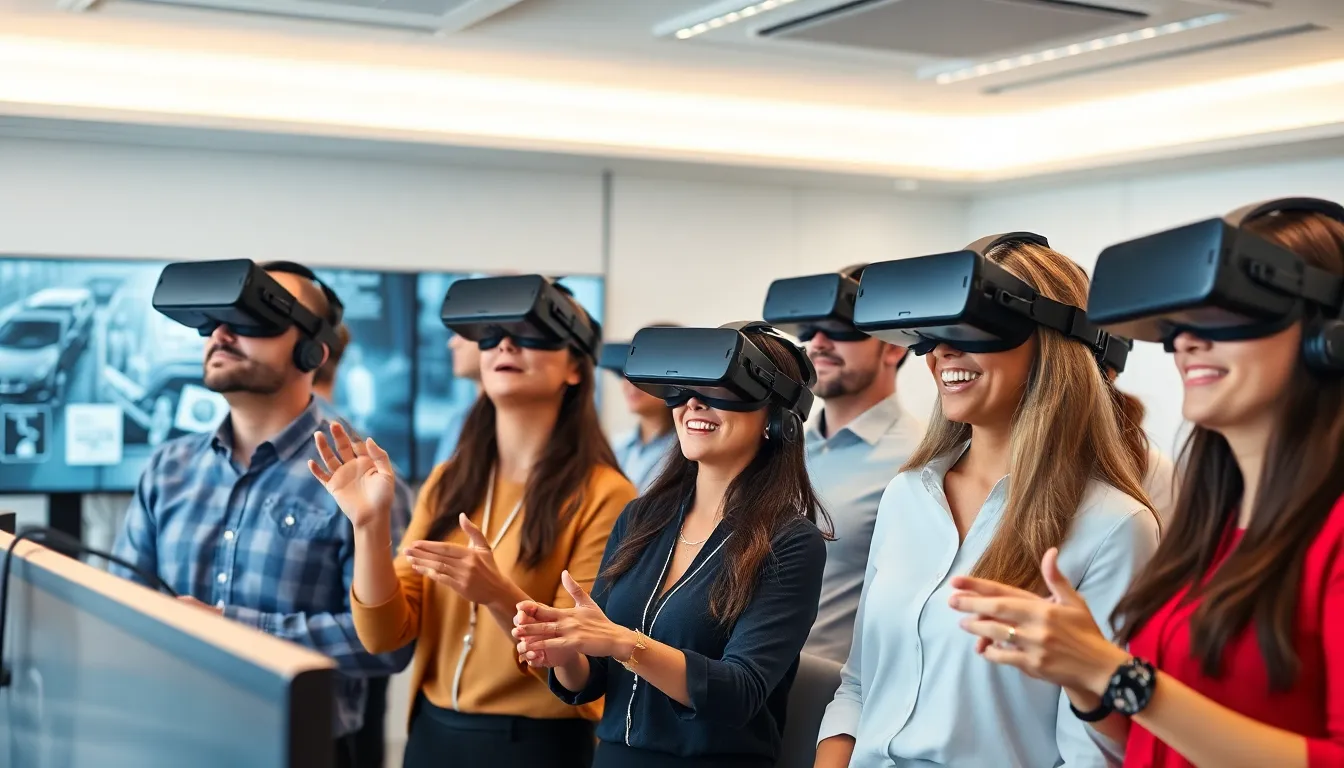As virtual reality technology continues to evolve, the demand for specialized support services is skyrocketing. Businesses and individuals alike are discovering the transformative potential of VR, but navigating this complex landscape can be daunting. That’s where VR support services come in, providing essential expertise and assistance tailored to diverse needs.
These services not only enhance user experience but also ensure seamless integration into various applications, from gaming to training simulations. By leveraging VR support, users can maximize their investment and unlock the full potential of immersive technology. Whether it’s troubleshooting technical issues or offering training and development, VR support services are becoming a crucial component in the journey toward a fully realized virtual experience.
Table of Contents
ToggleOverview Of VR Support Services
VR support services encompass a range of expert assistance specifically designed to enhance the use of virtual reality technology. These services address common challenges faced by businesses and individuals, offering tailored solutions for diverse applications including gaming, training, and education.
Key components of VR support services include:
- Technical Support: Provides troubleshooting help for hardware and software issues, ensuring optimal performance.
- Setup Assistance: Guides users through initial installation and configuration, simplifying the entry into VR environments.
- Content Development: Offers design and creation of immersive VR experiences, catering to unique user requirements.
- Training Programs: Delivers instructional sessions for users and developers, fostering effective use of VR tools and software.
- Integration Services: Ensures seamless merging of VR systems with existing technology infrastructures, minimizing disruption.
Firms utilizing VR support services can expect improved user experiences. By leveraging expert guidance and customized solutions, users maximize productivity and engagement in virtual environments.
Importance Of VR Support Services

VR support services provide essential expertise, aiding users in navigating complex virtual environments. They enhance user experiences and facilitate a smoother integration of VR technology into various applications.
Enhancing User Experience
Enhancing user experience remains a primary objective of VR support services. They offer personalized assistance, ensuring users fully leverage VR capabilities. Services include troubleshooting common issues, optimizing hardware configurations, and providing tailored content recommendations. For instance, technical support specialists help resolve software glitches promptly, reducing frustration and downtime. By ensuring seamless installations and user-friendly interfaces, these services boost user satisfaction and encourage continued engagement with VR content.
Facilitating Accessibility
Facilitating accessibility is another critical facet of VR support services. They ensure that users, regardless of ability, can enjoy immersive experiences. Accessibility features might include adjustable settings for vision and hearing impairments, as well as user-friendly interfaces for those unfamiliar with technology. VR support teams assist in customizing environments to meet individual needs, making VR experiences more inclusive. By providing comprehensive training and resources, these services empower users to interact with VR technology confidently, broadening its reach across diverse audiences.
Types Of VR Support Services
Several types of VR support services cater to specific user needs, ensuring optimal engagement with virtual reality technology. These services focus on enhancing user experience, troubleshooting, and providing essential resources.
Technical Support
Technical support addresses hardware and software issues that may arise during VR use. It includes troubleshooting connectivity problems, resolving installation errors, and performing maintenance checks on VR devices. Experts assist users by remotely diagnosing issues or providing on-site solutions. They also guide users through software updates and configuration adjustments, minimizing operational disruptions.
User Training
User training equips individuals with the skills necessary to utilize VR tools effectively. Training programs cover the basic navigation of VR environments, specific software applications, and best practices for maintaining hardware. Sessions may occur in-person or remotely, allowing for flexible learning. Customized training modules can accommodate different experience levels, ensuring that everyone—from novice users to advanced practitioners—benefits from tailored instruction.
Content Development
Content development focuses on creating immersive experiences for various applications, including gaming, education, and virtual tours. Specialists collaborate with clients to design unique VR content that aligns with specific objectives. This service may involve 3D modeling, animation, and interactive element integration. By delivering engaging and high-quality content, developers enhance the overall user’s experience, enabling organizations to maximize their investment in VR technology.
Best Practices For Implementing VR Support Services
Implementing VR support services requires strategic planning and tailored approaches to meet user demands. Organizations must focus on understanding user needs and designing effective training initiatives.
Assessing User Needs
Assessing user needs lays the foundation for successful VR support services. Organizations should conduct thorough surveys and interviews to gather insights into user expectations and challenges. Key elements include identifying user demographics, grasping technical proficiency levels, and understanding specific use cases for VR technology. By segmenting users based on their preferences and capabilities, support teams can tailor solutions that enhance engagement and performance. Continuous feedback mechanisms also enable organizations to refine their services, ensuring they adapt to evolving needs.
Developing Comprehensive Training Programs
Developing comprehensive training programs equips users with essential skills for navigating VR environments. Support services must create structured curricula that address varying proficiency levels, from novice to advanced users. Key components should include hands-on workshops, interactive tutorials, and easily accessible online resources. Incorporating real-world scenarios fosters practical understanding and encourages skill application in relevant contexts. Measuring the effectiveness of training through assessments ensures users gain confidence and proficiency in utilizing VR technology. Regular updates to training materials also reflect advancements in VR applications, keeping users informed and engaged.
The rise of VR technology has created a significant need for specialized support services. These services not only enhance user experiences but also ensure that individuals and businesses can effectively harness the full potential of virtual reality. By providing tailored assistance in technical support, training, and content development, VR support services empower users to navigate this evolving landscape with confidence.
As VR continues to advance, the importance of these support services will only grow. They play a crucial role in making VR accessible to a wider audience and in maximizing the return on investment for users. Embracing these services is essential for anyone looking to thrive in the immersive world of virtual reality.






